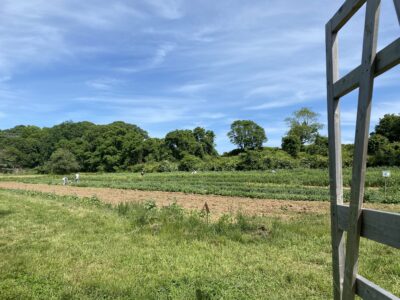Blog
Meet The Crew | Dorian Payán
Dorian Payan returns to Quail Hill Farm as Farm Production Manager
Dorian Payán
Hello, my name is Dorian and I am an advanced apprentice at Quail Hill Farm.
When asked where I am from, I like to say I straddle the US-Mexico border that crosses the Chihuahuan Desert. There is a city on each side with a heat unlike this one. It is not too shy to start in March and it is dry, like cracking open an oven door. I also like to mention that it actually does snow in the winter, but half-jokingly add that one inch of snow is enough to shut our cities down.
Most importantly, I like to make sure to tell people that I am a small-scale organic farmer. I am satisfied with the way I have come to connect vocation and place. The movement is hushed back home compared to here, but an overwhelming amount of us are one or two generations away from a lineage of proud peasant growers so it is intimate and personal. Most of us were taught never to return to the land with good reason, but I am a dissenter.
My family retired from farming because the Mexican government had no safety nets for farmers who relied on the summer monsoon rains. If it rained, it rained, and if it did not, we “made do.” After stressfully gambling with the forecasts year after year, my family was compelled to move north. This is a trajectory that I remember as I see waves of former land stewards and their children make their way up north very much like my family did over 30 years ago.
Having been born on the American side of the border, I was gilded with the privileges of a nice American lifestyle. I am proficient in both my first language and English and I have a college degree. Many of us did incredibly well when we left the land. We have assimilated. But despite that, some of us continue to be reminded by our ancestors what it meant to have to take on dramatic changes in order to prevail, and we are left wondering if these new generations of immigrants and their children will be allowed to do the same.
As a reclaimed farmer, I feel especially saddened that others can no longer live off the land in the way that I do once again. It is important to remember that my colleagues and I grow food for our community, namely because we can. Can, not in the sense that permit ourselves to, but in the sense that we are able to. By contrast, our distressed refugees find their land dry like my ancestors often did, and are no longer able to farm as we continue to exacerbate an already changing world. The effects we might fear for in ten years have already arrived for them. In many ways, these refugees are coming from the future — our worst possible scenario if we continue to live unfettered. And it is precisely solutions of the future that are necessary today. So this Tuesday, or Saturday, as you pick up your box share or kneel to harvest the cornucopia of vegetables, I invite you to reflect on your best self, what you might imagine yourself to be as a problem solver for the dilemmas of our days. After all, land conservation is as much repair as it is preservation for stewards and land alike, and being a member of Quail Hill Farm engenders that in all of us.
Best,
Dorian Payán


